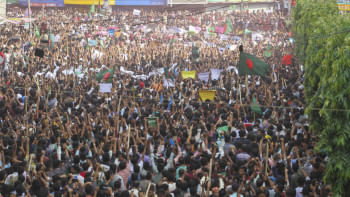There will come soft rains

It begins with a listless thought, brushed aside. What does a heartbeat sound like, you wonder. Brush, aside.
You ride the creaky elevator down to the parking lot. When it rains, it pours. It plants fat, wet kisses against the steel bars of the entrance gate, dull silver now on places where the paint has worn out. If you stand very close, and if you are lucky, then you will feel a faint spray of second-hand rain bouncing off the metal to your forehead, soaking the penciled-in arch of your brow.
You lasso the end of your orna like a slim, red bangle around your left wrist and wait, only as patiently as impatience can allow, for the driver to return from his excursion to the tea stall across the road. It has never occurred to you to drink tea priced char taka from the mouth of a cup kissed by many but you will forgive him when he arrives later than the five minutes he promised and again when he smothers his wetness against the car seat, only because the rain can smell oh so divine. (And, perhaps, also a little because you are not your father, not yet.)
But he returns, eventually, and you watch the neighbourhood buildings with their multicoloured gamcha hanging from makeshift clotheslines and wooden dolna swinging precariously blur into a reel of shifting images as the car pulls out.
At first, the sky is petulant, pelting rain droplets hard against your car window but it soon loses interest, slowing to a gentle drizzle like a water tap left on by accident. Drip, drip, drip.
You watch the mud squelching under rickshaw tires and think again that listless thought. What does a heartbeat sound like?
You hear the driver curse a mouthful when oncoming traffic is swept into a stuffy embrace. It loves you often, like this, this city. Some days, you don't know why you even complain.
Your neighbour is a double-decker bus dressed in the austere colours of your nation. It is beautiful, you think, even with its green-painted metal dimples in places where an unruly car may have bumped into. It wears the strip of red like a band-aid, you decide after some contemplation. It's not bad, really, as metaphors go.

A boy who resembles more man with his laugh lines and finger-picked hair stares from the upper window. You could be offended but you decide not to be. His gaze is curious, a little weary. Later, much later, it will occur to you that he was not staring at you at all but the sweeping, silver catenary of your car roof. Must've been all that shine.
A child navigates through the intricate labyrinth of vehicles to arrive at your window, his plaintive voice knocking against the glass half-heartedly. He wipes your window, offers to do some more for pach ta – but you have already turned away, ducking your head like someone caught listening into a conversation they had no business listening into, no business being a part of. You do not resurface until the scampering of little feet signal the child's departure, until an old blind man too has passed by in futile.
It is almost sunny when the car releases a long-held breath and starts anew. You roll down the window, ushering in the smell of wet earth like a favourite khala, breathing in deeply with it the undertones of exhaust fumes and human perspiration.
You count verandas, struck by the simultaneous similarity and dissimilarity of the scores of wayside homes. You read aloud quietly the names of Dr. So-and-So, Son of Barrister So-and-So and Wife (who, incidentally, shares your dadi's maiden name), written in lettering that may or may not be bold (because in Bangla, it all reads the same) on name plates peeking out under the dome of rosette kiss-me-at-the-gates.
At the next red light (that your car zooms past), you watch a flat-chested hijra swirling an orna, red as yours, sashay away, pausing periodically to flash a betel-leaf-stained tangerine smile at the owners of small, roadside hash houses. You wonder if anyone's ever told them they're beautiful.
You roll the window up hastily as a garbage van cycles by too close to comfort, holding your breath until it is lost in the mass of metal bodies. You watch it go, go, go. The boy couldn't have been a year younger.
The car squeezes into an alleyway, replacing shopping malls and eateries with walls worn with age, wearing a dirty handprint here and there and black-and-white advertisements on their otherwise bare bodies. A woman passes by, her orna tucked primly behind her ears, her fingers bony and bare except for a gaudy gold ring. She peers inside, no pretense of being surreptitious and seemingly satisfied with evidence of life, goes her merry way.
The car dozes against an old mosque with a minaret cracked almost halfway like a peanut shell to reveal the muaddhin's podium. The driver, you know, has already gone in search of a nearby tea stall.
You climb the winding stairs to your friend's home on the sixth floor (as the elevator is out of use), pausing to catch your breath now and then, hearing a bird or a car horn or a mother's shrill voice. You have just reached the landing on the fifth floor when it dawns on you.
You place a palm, moist and soft with sweat, in a searching, sentimental gesture against your chest. A little left, a little more. Yes, just right.
You ask yourself, 'What does a heartbeat sound like?' And your heart, curled under your palm answers with a steady dhak-dhak-dhaka.
Nuzhat Biswas is the oft-curious hypen betwixt an incurable humanist.


 For all latest news, follow The Daily Star's Google News channel.
For all latest news, follow The Daily Star's Google News channel. 



Comments